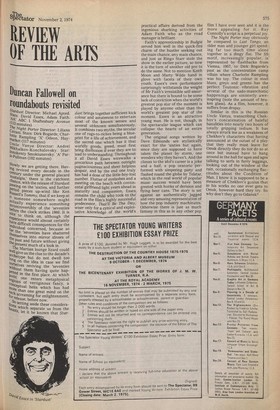Duncan FaHowell on roundabouts revisited
Stardust Director: Michael Apted. Stars: David Essex, Adam Faith. :M' ABC 1 Shaftesbury Avenue 013 minutes) he Night Porter Director: Liliana Cavani, Stars: Dirk Bogarde, Charlotte Rampling 'X' Odeon, Haymarket (117 minutes)
Uncle Vanya Director: Andrei Mikhalkov-Konchalovsky. Star: ,Innokenty Smoktunovsky. Par's-Pullman (102 minutes)
Slowi ; Y we are getting there. Hav
ing revived every decade in the century under the general placard 'nostalgia, there is the catchiest Chance. with the release of Stardust Pawing on the 'sixties, and further Period pieces up-wind like Ken Russell's Tommy, that if we keep at Lt someone somewhere might ;actually experience something incontrovertibly of .the 'seventies before the clock strikes 1980. It is nice to think on, although the eLxPerience would almost certainly nave difficult consequences for the individual concerned, because so faj the 'seventies have shattered !fl.ernselves into mirror slivers of th Past and future without giving "ie Present much of a look in. The Martian lounge lizard could Well give us the clue to the decade's L'chetype but do not dwell too icing on the idea in case we find Ourselves reviving the 'seventies Without them having quite hap
Pened in the first place. At which
one enters metaphysical 'egions of vertiginous fancy, a c°nceptual helix which has had rintlre than one great mind on the
t,..orack screaming for enlightenment, release, before now.
t, So setting aside these considerai.:°ns which separate us from the b° Which let it be known that Star
dust brings together sufficient kick colour and astuteness to entertain most of the known senses and several unknown simultaneously. It combines two myths, the secular one of rags-to-riches being a blueprint for a life of achievement, and the sacred one which has it that worldly goods, greed, must first bring disillusion if ever they are to lead to understanding. Throughout it all David Essex wirewalks a precarious path between outright pugnaciousness and sheer helpless despair, and by the end one truly has had a dose of the little-boy-lost number. Flutter of eyelashes and a meeting on the beach with continental girlfriend light years ahead in maturity and compassion, Essex remains the child who took to the road in the film's highly successful predecessor, That'll Be The Day, wiser only for a cynical and exploitative knowledge of the world's practical affairs derived from the ingenious sharking activities of Adam Faith who as the road manager is brilliant.
Faith's apprenticeship in Budgie served him well in the quick-fire charm of the hustler seeking out the main chance, any main chance, and just as Ringo Starr stole the show in the earlier picture, so now it is the turn of another old pro to do the same. Not to mention Keith Moon and Marty Wilde hand in glove with facets of their own youth. Essex's own performance surprisingly withstands the weight of Mr Faith's irresistible self-assurance but there is bound to be some lack of conviction when the world's greatest pop star of the moment is played by anyone other than the world's greatest pop star of the moment. Essex is an attractive young man. He is not, though, in the spectacular league which can collapse the hearts of an entire generation. The original songs written by Dave Edmunds are stylistically exact for the 'sixties but again, since they are supposed to have taken the planet by storm, one wonders why they haven't. And the climax to the idol's career is a joke and a half, a pop oratorio performed with simpering piety and flashed round the globe by Telstar, which in the real world of popular music success would have been greeted with honks of derision and flying beer cans. The story is set against an authentically jagged and very amusing representation of how the pop industry machinates. Otherwise there is just as much fantasy in this as in any other pop film I have ever seen and it is the more appealing for it. Ray Connolly's script is a perpetual joy.
The Night Porter may obviously be compared to Last Tango, an older man and younger girl spending far too much time alone together in a dingy flat. The SS motif, increasingly popular, is represented by flashbacks from Vienna, 1957, to Dirk Bogarde's past as the concentration camp villain where Charlotte Rampling was his toy. The colour in steel blues, greys and greens has the perfect Teutonic vibration and several of the sado-masochistic happenings are sinisterly aweinspring (note the amount of broken glass). As a film, however, it suffers from dropsy.
Similar in this is the Russian Uncle Vanya, transcribing Chekhov's concatenation of baleful banalities into nearly two hours of totally gripping tedium. It has always struck me as a weakness of Chekhov's characters that having announced at the outset of a play that they really must leave for Omsk directly they do not do so at once but instead have to hang around in the hall for ages and ages talking to serfs in furry leggings, looking out of the window at the rain, occasionally exchanging flaccitudes about the Condition of Man. I know it is supposed to be a measure of Chekhov's genius that in his works no one ever gets to Omsk, however hard they try. So why don't they go to Gdansk?


































 Previous page
Previous page